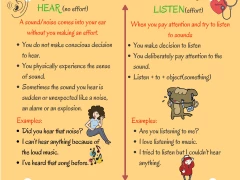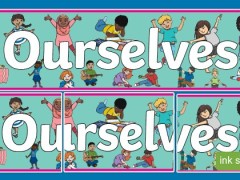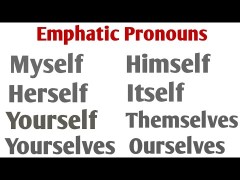dad [dæd] n. 爸爸(儿语)
key [kiː] n. 钥匙
baby [ˈbeibi] n. 婴儿
【派】babyhood 婴儿时期 babysitter 保姆
【扩】nestling 婴孩 neonate 初生婴儿 nursling 婴儿
* * *
A: The baby is crying.
B: Maybe he is hungry.
A:那个婴儿哭了。
B:也许他是饿了。
* * *
hear [hiə] v. 听见
【派】hearing 听力
【扩】sound 听起来
【搭】hear of 听说
hear from 收到某人的来信
* * *
A: I can't hear anything.
B: Me too. It is so noisy here.
A:我什么也听不到。
B:我也是,这儿太吵了。
* * *
enjoy [inˈdʒɔi] v. 玩得开心
【构】en(表示“使、让”的前缀)+joy(欢乐)=enjoy(玩得开心)
【派】enjoyment 享受
【扩】relish 享受
【搭】enjoy oneself 玩得开心
enjoy the food 享用食物
* * *
A: How is the party last night?
B: We didn't enjoy ourselves at all.
A:昨晚的聚会怎么样?
B:我们玩得一点儿都不痛快。
* * *
yourself [jəˈself] pron. 你自己
* * *
A: It's a photograph that I took on my vacation last year.
B: You took it yourself?
A:那是我去年度假时拍的照片。
B:你自己拍的吗?
* * *
ourselves [ˌauəˈselvz] pron. 我们自己
mum [mʌm] n. 妈妈
Lesson 66 What's the time? 几点钟?
myself [maiˈself] pron. 我自己
* * *
A: I'm ashamed of myself.
B: Don't be so hard on yourself.
A:我为自己感到羞愧。
B:别太难为自己了。
* * *
themselves [ðəmˈselvz] pron. 他们自己
* * *
A: What's your opinion of people smoking in the office?
B: Well, in my opinion, people shouldn't smoke in the office. It does not only do harm to themselves but also to other people's health.
A:对于人们在办公室吸烟的行为您怎么看?
B:嗯,我的观点是人们不应该在办公室吸烟,不但会给他们自己带来伤害,也有害于别人的身体健康。
* * *
himself [himˈself] pron. 他自己
* * *
A: To save brokerage fee, he decided to have them sold by himself.
B: I don't think it will be helpful.
A:为了节约佣金,他决定自己销售。
B:我不认为这样会有帮助。
* * *
herself [həːˈself] pron. 她自己
noun [专属名词]爸爸;爹爹 - How do you feel, Dad?
noun [可数名词]钥匙;(电脑、打字机或乐器的)键;关键,要诀;答案;音调,声调;图例,符号说明;低岛,礁;扳手;销子,楔;(文章、形势等)主调,基调;(梣树、枫树或无花果树的)翼果;板条间首层灰泥;(有助于石膏等黏附的)粗糙表面;罚球区 - He turned the key in the lock.
verb [vi. 不及物动词]键入;成为(获胜)的关键;<非正式>用钥匙划坏(汽车);用别针(或楔子、栓)固定;将…的表面处理好;给(广告)加识别编码 - He turned the key in the lock.
adjective [原级]关键的,主要的 - The key doesn't fit the lock.
key struct 重点句型
key point 关键点
x 的钥匙
- 门的钥匙:the key to the door
- 车的钥匙:the key to the car
所有格
- 书的颜色:the color of the book 无生命的所有格
- 张艺谋的电影:ZhangYimou’s movie 有生命的所有格
noun [专属名词]婴儿,婴孩;动物幼崽;(家庭或团体中)最小的成员;幼稚的人,软弱的人;差事,责任;宝贝,亲爱的;喜欢的东西,宝贝东西 - She used to take care of me when I was a baby.
verb [vt. 及物动词]把…当婴儿般对待,对…娇生惯养;小心翼翼地操作,小心对待 - You have to wake up now, baby.
adjective [原级]蔬菜)幼嫩的;(幼)小的,小型的 - Cook the baby potatoes in their skins.
verb [vt. 及物动词]听到,听见;聆听,倾听;听说,得知;审理,听审;脑际响起;听明白 - She heard no further sounds.
- Listen! Can you hear it? 听,你能听见吗?
- Look! Can you see it? 看,你能看见吗?
- Look for it! Can you find it? 找一下,能你找到吗?
verb [vi. 不及物动词]享受,欣赏,喜爱;过得愉快,玩得开心(enjoy oneself);享有,拥有;<美,非正式>请尽情享用; <美,非正式>请尽情享用 - Ross had always enjoyed the company of women.
pronoun [反身代词]你自己 - Do it yourself—I don't have time.
| 人称 | 主格 | 反身代词 | 主格 | 反身代词 |
|---|---|---|---|---|
| 单数 | 复数 | |||
| 第一人称 | I | myself | we | ourselves |
| 第二人称 | you | yourself | you | yourselves |
| 第三人称 | he | himself | they | themselves |
| she | herself | |||
| it | itself | |||
pronoun [反身代词]我们自己;我们亲自 - We had the pool all to ourselves.
| 人称 | 主格 | 反身代词 | 主格 | 反身代词 |
|---|---|---|---|---|
| 单数 | 复数 | |||
| 第一人称 | I | myself | we | ourselves |
| 第二人称 | you | yourself | you | yourselves |
| 第三人称 | he | himself | they | themselves |
| she | herself | |||
| it | itself | |||
pronoun [反身代词]我自己;我亲自;我的正常的健康状况和正常情绪 - You use myself to emphasize a first person singular subject. In more formal English, myself is sometimes used instead of "me" as the object of a verb.
| 人称 | 主格 | 反身代词 | 主格 | 反身代词 |
|---|---|---|---|---|
| 单数 | 复数 | |||
| 第一人称 | I | myself | we | ourselves |
| 第二人称 | you | yourself | you | yourselves |
| 第三人称 | he | himself | they | themselves |
| she | herself | |||
| it | itself | |||
pronoun [反身代词]他们自己;他们亲自 - They did the cooking by themselves.
| 人称 | 主格 | 反身代词 | 主格 | 反身代词 |
|---|---|---|---|---|
| 单数 | 复数 | |||
| 第一人称 | I | myself | we | ourselves |
| 第二人称 | you | yourself | you | yourselves |
| 第三人称 | he | himself | they | themselves |
| she | herself | |||
| it | itself | |||
pronoun [反身代词]他自己;他亲自,他本人 - He poured himself a whisky and sat down in the chair.
| 人称 | 主格 | 反身代词 | 主格 | 反身代词 |
|---|---|---|---|---|
| 单数 | 复数 | |||
| 第一人称 | I | myself | we | ourselves |
| 第二人称 | you | yourself | you | yourselves |
| 第三人称 | he | himself | they | themselves |
| she | herself | |||
| it | itself | |||
pronoun [反身代词]她自己(she 的反身代词);她亲自 - In written English, herself is sometimes used to refer to a person without saying whether that person is a man or a woman.(
| 人称 | 主格 | 反身代词 | 主格 | 反身代词 |
|---|---|---|---|---|
| 单数 | 复数 | |||
| 第一人称 | I | myself | we | ourselves |
| 第二人称 | you | yourself | you | yourselves |
| 第三人称 | he | himself | they | themselves |
| she | herself | |||
| it | itself | |||










